
Samuel-Alexandre Rousseau (Neuve-Maison, 11 June 1853 - Paris, 1 October 1904) was a French composer. [1] [2]

Samuel-Alexandre Rousseau (Neuve-Maison, 11 June 1853 - Paris, 1 October 1904) was a French composer. [1] [2]
His father made pump organs and Samuel entered the Paris Conservatoire when he was fourteen years old. He studied with Cesar Franck, [3] and Francois Bazin [4]
He was choirmaster at Sainte-Clotilde, Paris. [5] He composed the comic opera, Leone. [6] [7]
He won the Prix de Rome in 1878, [4] [8] and the Legion of Honour in 1900.
He was Marcel Samuel-Rousseau's father.

Olivier Eugène Prosper Charles Messiaen was a French composer, organist, and ornithologist, one of the major composers of the 20th century. His music is rhythmically complex; harmonically and melodically he employs a system he called modes of limited transposition, which he abstracted from the systems of material generated by his early compositions and improvisations. He wrote music for chamber ensembles and orchestra, vocal music, as well as for solo organ and piano, and also experimented with the use of novel electronic instruments developed in Europe during his lifetime.
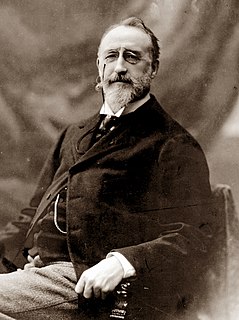
François Clément Théodore Dubois was a French composer, organist, and music teacher.

Étienne Nicolas Méhul was a French composer, "the most important opera composer in France during the Revolution". He was also the first composer to be called a "Romantic". He is known particularly for his operas, written in keeping with the reforms introduced by Christoph Willibald Gluck.

Adolphe Charles Adam was a French composer, teacher and music critic. A prolific composer for the theatre, he is best known today for his ballets Giselle (1841) and Le corsaire (1856), his operas Le postillon de Lonjumeau (1836) and Si j'étais roi (1852) and his Christmas carol "Minuit, chrétiens!".

Reynaldo Hahn was a Venezuelan-born French composer, conductor, music critic, and singer. He is best known for his songs – mélodies – of which he wrote more than 100.

Alexander Tansman was a Polish composer, virtuoso pianist and conductor of Jewish origin, since 1938 a French citizen. One of the earliest representatives of neoclassicism, associated with École de Paris, he was praised for his mastery in orchestration, instrumentation and his original approach to harmony and form. Tansman was a globally recognized composer.

André George(s) Louis Onslow was a French composer of English descent. His wealth, position and personal tastes allowed him to pursue a path unfamiliar to most of his French contemporaries, more similar to that of his contemporary German romantic composers; his music also had a strong following in Germany and in England. His principal output was chamber music, but he also wrote four symphonies and four operas. Esteemed by many of the critics of his time, his reputation declined swiftly after his death and has only been revived in recent years.
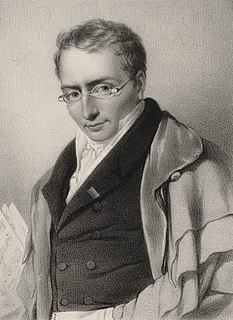
Louis Joseph Ferdinand Herold, better known as Ferdinand Hérold, was a French composer. He was celebrated in his lifetime for his operas, of which he composed more than twenty, but he also wrote ballet music, works for piano and choral pieces. He is best known today for the ballet La Fille mal gardée and the overture to the opera Zampa.
Opéra comique is a genre of French opera that contains spoken dialogue and arias. It emerged from the popular opéras comiques en vaudevilles of the Fair Theatres of St Germain and St Laurent, which combined existing popular tunes with spoken sections. Associated with the Paris theatre of the same name, opéra comique is not necessarily comical or shallow in nature; Carmen, perhaps the most famous opéra comique, is a tragedy.

Alexandre Charles Lecocq was a French composer, known for his opérettes and opéras comiques. He became the most prominent successor to Jacques Offenbach in this sphere, and enjoyed considerable success in the 1870s and early 1880s, before the changing musical fashions of the late 19th century made his style of composition less popular. His few serious works include the opera Plutus (1886), which was not a success, and the ballet Le cygne (1899). His only piece to survive in the regular modern operatic repertory is his 1872 opéra comique La fille de Madame Angot. Others of his more than forty stage works receive occasional revivals.

Pierre-Alexandre Monsigny was a French composer and a member of the French Académie des Beaux-Arts (1813).

Hervé, real name Louis Auguste Florimond Ronger, was a French singer, composer, librettist, conductor and scene painter, whom Ernest Newman, following Reynaldo Hahn, credited with inventing the genre of operetta in Paris.

Abraham Louis Niedermeyer was a Swiss and naturalized French composer.
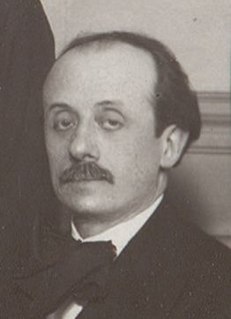
Marcel Samuel-Rousseau was a French composer, organist, and opera director.

Maximilien-Paul-Marie-Félix d'Ollone was a 20th-century French composer.

Music in the city of Paris, France, includes a variety of genres, from opera and symphonic music to musical theater, jazz, rock, rap, hip-hop, the traditional Bal-musette and gypsy jazz, and every variety of world music, particularly music from Africa and North Africa. such as the Algerian-born music known as Raï. Leading musical institutions include the Paris Opera, the Orchestre de Paris, and the Paris Conservatory, the first state music conservatory in Europe. The Cité de la Musique at La Villette is home of the new Paris Symphony Hall, the Conservatory, a museum of musical instruments, and Le Zenith, a major venue for popular music. Many of the churches in Paris have magnificent historic organs, and often host concerts. The city is also known for its music halls and clubs.
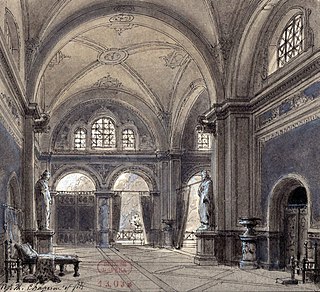
Frédégonde is an 1895 French opera in five acts with music by Ernest Guiraud, Camille Saint-Saëns, and Paul Dukas and a libretto by Louis Gallet based on Augustin Thierry's Récits des temps mérovingiens [Tales from the time of the Merovingians] (1840).
Alexandre Dratwicki is a contemporary French musicologist.
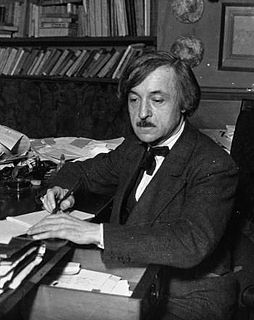
Raoul Laparra was a French composer.

L'île du rêve is an 1898 French opera set in Polynesia. It was the first opera by Reynaldo Hahn.